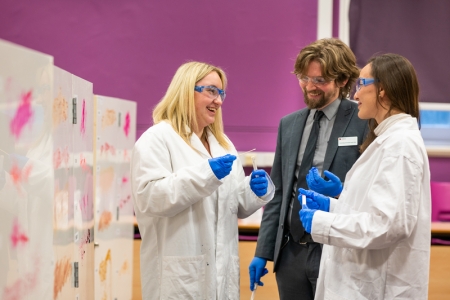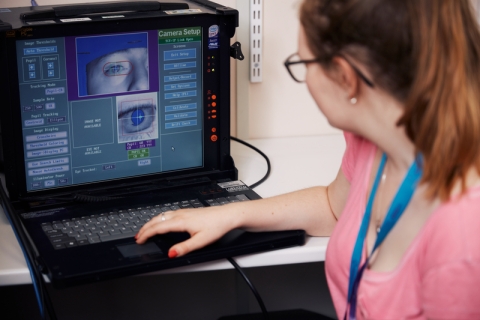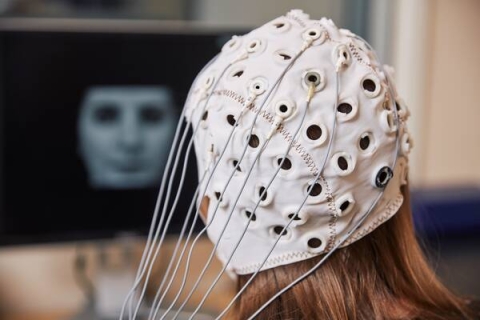
Key information
UCAS code:
C810
Accreditation:
This course is Accredited
Typical offer:
112-120 UCAS points from 3 A levels, or equivalent
Showing content for section Overview
Overview
Explore how psychological knowledge informs criminal investigations and forensic practice, and help to understand offending behaviour on this BSc (Hons) Forensic Psychology degree, accredited by the British Psychological Society (BPS).
While a psychology degree covers the mind and behaviour in a wider sense, studying forensic psychology means focusing on the way people think, act and feel in relation to crime and legal issues.
Psychology at the University of Portsmouth is ranked 5th of the modern universities for research quality
Research Excellence Framework (REF) 2021
Course highlights
- Put your investigative techniques to the test in our Forensic Interviewing Suite, which features thermal imaging cameras, eye tracking and virtual reality (VR) technology and advanced digital and video analysis
- Have the chance to study abroad or take part in a year-long work placement, boosting your employability prospects after the course
- Learn from forensic psychology practitioners involved in the International Centre for Research in Forensic Psychology, the largest academic research centre for forensic psychology in the UK
- Become eligible to apply for graduate membership of the British Psychological Society (with a 2:2 or higher) – an essential first step to becoming a professional forensic psychologist
90%
of graduates in work or further study 15 months after this course
(HESA Graduate Outcomes Survey 2018/19)

93%
overall student satisfaction for our BSc (Hons) Forensic Psychology course
(NSS, 2022)

Accredited by:
This degree offers eligibility for Graduate Basis for Chartered Membership (GBC) of the British Psychological Society (BPS), if you graduate with a 2:2 or higher.

Join us for our Festival of Crime
A day of interactive crime displays showcasing the latest advances in tackling and understanding crime.
On the day, you can:
- Walk through interactive crime scenes and help solve the crime with interactive CSI
- Understand the criminal mind as our psychologists present an interactive display
- Meet bestselling author Elly Griffiths, creator of the Dr Ruth Galloway mysteries, plus much more
This free event is open to the public, with activities for all ages.
Saturday 4 May, 10am-4pm
Hear from BSc Forensic Psychology student, Phoebe
Phoebe, one of our Forensic Psychology BSc students, talks about her experiences on the course and her plans after graduation at the University of Portsmouth.
Phoebe: I wanted to study psychology because I did forensic science at college and I absolutely loved it. I read up on the course here for Forensic Psychology and thought that sounds amazing, just what I want to do. So I applied, got in and here I am.
It's just all the skills you build up through uni. You engage with so many different people, you really learn group work and think these are all going to help me for my future career.
So after my third year, I'd like to go on to do a master's degree. I hopefully would like to do it at Portsmouth because I love it here. I would definitely like to work in prisons. I think it would be interesting to assess offenders. I'm hoping that going into my master's will open up more avenues and it might completely change my mind.
I have really enjoyed my offending behaviour model. It's been all to do with different offenders, why they offend and it's been so interesting. I have also really enjoyed doing my dissertation. I've had to interview different people. It quite rewarding doing your own research as well because you have put in all that work yourself.
I would recommend University of Portsmouth. It's such a great location. It's got a great atmosphere. The courses are brilliant and the support is fantastic. I've just completely enjoyed it. It's just been such a great experience.
Contact information
Contact AdmissionsEntry requirements
BSc (Hons) Forensic Psychology degree entry requirements
Typical offers
- A levels - BBB-BBC
- UCAS points - 112-120 points from 3 A levels, or equivalent. (calculate your UCAS points)
- T-levels - Merit
- BTECs (Extended Diplomas) - DDM-DMM
- International Baccalaureate - 29
You may need to have studied specific subjects – find full entry requirements and other qualifications we accept.
English language requirements
- English Language proficiency at a minimum of IELTS band 6.5 with no component score below 6.0.
See alternative English language qualifications.
We also accept other standard English tests and qualifications, as long as they meet the minimum requirements of your course.
If you don't meet the English language requirements yet, you can achieve the level you need by successfully completing a pre-sessional English programme before you start your course.
We look at more than just your grades
While we consider your grades when making an offer, we also carefully look at your circumstances and other factors to assess your potential. These include whether you live and work in the region and your personal and family circumstances which we assess using established data.
If you don't meet the entry requirements, you may be able to join this course after you successfully complete a foundation year.
Facilities and specialist equipment

Eye tracking and VR technology
Discover how eye-tracking and virtual reality (VR) equipment can be used to improve our understanding of interviewing techniques and detecting deception, and used to study areas such as offender behaviours, emotions and cognitions.

Psychophysiology laboratory
Record and analyse physical responses, such as electrical activity in the brain, neural processes, blood pressure and heart rate, to explore how the body reacts to different psychological states.

Thermal cameras
Learn how thermal camera technology can be used to read physiological activity in the face and reveal signs of deception.
See our forensic psychology facilities and equipment in action
Take a tour of King Henry Building at the University of Portsmouth and the specialist psychology equipment and facilities we use in our Forensic Psychology BSc and Psychology BSc courses.
Video showing the specialist psychology equipment and facilities we use in our Psychology BSc and Forensic Psychology BSc courses at the University of Portsmouth: interview room, thermal camera, eye tracking, psycho-physiology lab, and more.

"The thing that really hooked me? The facilities. There’s a fully functioning forensic lab that I can use here!
Now I’m studying forensic psychology, with elements of criminology, that is focused on understanding the abnormalities in people’s thinking and learning how to fix them."
Careers and opportunities
Forensic psychology is the study of the mind as it relates to legal issues, investigations and criminal behaviour. It includes everything from the moment a crime is committed (before an arrest) through to a criminal investigation and the following legal proceedings, to the monitoring, rehabilitation and release of an offender back into the community.
On this BSc (Hons) Forensic Psychology, you'll gain hands-on experience conducting research on forensic topics with developments at the forefront of psychological science. You’ll explore the patterns and behaviours of offenders and victims, build skills in gathering and analysing forensic data, and learn how to present your findings.
When you complete the course with a 2:2 or higher, you'll be eligible for graduate membership of the British Psychological Society (BPS), which is an essential first step to becoming a Chartered Forensic Psychologist. To become Chartered, you'll also need to do further academic training for up to 5 years, including an MSc Forensic Psychology.
As a Chartered Forensic Psychologist, you'll be ready for a career in HM Prison and Probation Service (HMPPS), within the NHS (such as in rehabilitation units and secure hospitals), or within social services, including the police service, young offenders units and the probation service.
What areas can you work in with a forensic psychology degree?
Many graduates go on to do an MSc in Forensic Psychology after the course. You could also start a career in areas such as:
- teaching
- health associated professions
- social welfare
- police work
- probation service
- research
Graduate roles and destinations
Roles our previous graduates have gone on to include:
- clinical psychologist
- forensic psychologist
- educational psychologist
- counsellor
- health planning analyst
They've taken roles in the following organisations:
- National Probation Service
- Ministry of Defence
- North East London NHS Foundation Trust
Potential salary
As a trainee forensic psychologist within HM Prison and Probation Service (HMPPS), you could expect a starting salary of between £27,021 and £34,461.
Once you qualify as a Chartered Forensic Psychologist, you could earn from £37,218 and £46,846 and up to £53,952 as a senior Chartered Forensic Psychologist.
Working for the NHS in 2021, you would start as a trainee forensic psychologist on £32,306 to £39,027 (Band 6). With a role as a Chartered Forensic Psychologist, your salary could reach up to £45,839 (Band 7) or more with further experience.
Ongoing careers support
After you graduate, you can get help, advice and support for up to 5 years from our Careers and Employability Service as you advance in your career.

In my first year we visited the courts of law and sat in the public gallery to watch a court case. In our course you have the chance to participate in studies and I think this is valuable experience to get an idea of what it would be like to conduct and administer your own research study.
Placement year
After your second or third year, you can do an optional work placement year to get valuable longer-term work experience in the field. A placement year gives you the opportunity to apply your knowledge in a real workplace, boosting your employability and making you stand out to employers after the course.
You can work for a company or organisation here in the UK or overseas, or you could go independent by setting up and running your own business with other students.
Whichever route you choose, you'll receive support and guidance. Our specialist team of Science and Health Careers advisors can help you with finding a work placement and improving your employability skills. They'll provide you with a database of placement vacancies, support with your job search – including help with applications and interviews – and support throughout your placement year.
Potential prison placements
Previous students have completed work placements in medium secure units, youth offending teams and prisons, including:
- HMP Bronzefield
- HMP Ford
- HMP Winchester
Potential placement destinations
Other students have taken placement roles in organisations including:
- Broadmoor High Security Hospital
- Hampshire Constabulary Student Watch
- Catch 22 - a not-for-profit business involved in offender management, rehabilitation and victim services
- Motiv8 - a charity working for safer communities for young people and their families
Study abroad
You’ll also have the chance to study abroad at one of our partner universities in Europe or Asia, which is a fantastic opportunity to explore a new destination and experience the world as an international student.
Many of our students describe their time spent studying overseas as truly life-changing, as well as an excellent way to stand out to future employers.
Hear from Dr Lucy Akehurst, Head of the Department of Psychology
Dr Lucy Akehurst, Head of Department of Psychology, talks about the exciting facilities available to current and future students.
Dr Lucy Akehurst: When our first year undergraduate students arrive at the Department of Psychology, I think they feel part of the community straight away.
We pride ourselves on our tutorial system at the University of Portsmouth. Staff are working with students from the word go.
We have a number of laboratory facilities and each of them house specialist equipment. We've got a baby and infant lab. We have a suite of labs, there's observation facilities, one way mirrors and recording equipment. We also have a Psychophysiology lab which has an EEG machine and eye tracking. We also have a motion capture laboratory. We have special cameras that pick up the sensors that the students have placed on their participants just to see how the human body moves when we perform particular actions.
The nice thing about coming to Portsmouth is that undergraduate students from the word go have access to those facilities.
Modules
Each module on this course is worth a certain number of credits.
In each year, you need to study modules worth a total of 120 credits. For example, in the first 2 years, you'll study 6 modules, each worth 20 credits. In the final year of your degree, you'll study 4 modules worth 20 credits and 1 module worth 40 credits.
What you'll study
Core modules
All modules in this year are core.
Core modules
All modules in this year are core.
Optional modules
All modules in this year are optional.
Particular emphasis will be given to effect sizes and confidence intervals. At a practical level, the module will develop advanced statistical analysis skills using appropriate computer packages and support you to develop your skills in both reporting and interpreting statistical results.
You’ll get familiar with the big issues and contemporary debates in education studies as well as the role and expectations of a teacher.
You’ll develops fundamental knowledge and skills that teachers require, as well as your capability to structure and critique a lesson plan.
You'll be required to draw upon appropriate research methods to gather data that addresses a specific research question or psychological issue. The rationale for the study, the adopted research methodology and the findings are presented in an extended report. Your proposed research must undergo a formal ethical review process before project work may begin. You'll be allocated to a project supervisor, prior to the start of Level 6, who will support you via regular meetings during the project. The module also contains an integrated personal tutorial system.
You'll be required to draw upon appropriate research methods to gather data that addresses a specific research question or psychological issue. The rationale for the study, the adopted research methodology and the findings are presented in an extended report. You'll also present a verbal justification for your study and the approach adopted in the form of a project interview assessment. Your proposed research must undergo a formal ethical review process before project work may begin. You'll be allocated to a project supervisor, prior to the start of Level 6, who will support you via regular meetings during the project. The module also contains an integrated personal tutorial system.
Boost your employability by taking an industry-based work placement year with a relevant organisation or immerse yourself in another culture by studying for a year at one of our partner universities worldwide.
This is an amazing opportunity to either put everything you’ve learned so far into action in a real workplace or expand your horizons and set yourself up for your future career by studying abroad and becoming a student ambassador for our university.
Depending on what you choose, we’ll help you find and secure an exciting placement opportunity within an appropriate company or organisation, or you’ll expand your global perspective and develop additional skills to boost your future career during a study abroad year.
This is a Connected Degree
We're the only university that gives you the flexibility to choose when to take a work placement. Take it after your 2nd year, before returning to finish your studies. Or after your final year, connecting you into the workplace.
If you're not sure if or when to take your placement, don't worry. You'll have plenty of time to settle into your studies and explore your options before making your choice.
Changes to course content
We use the best and most current research and professional practice alongside feedback from our students to make sure course content is relevant to your future career or further studies.
Therefore, some course content may change over time to reflect changes in the discipline or industry. If a module doesn't run, we'll let you know as soon as possible and help you choose an alternative module.
How you're assessed:
You’ll be assessed through:
- written examinations
- practical reports and essays
- poster presentations
- oral presentations
- self-led research project
You’ll be able to test your skills and knowledge informally before you do assessments that count towards your final mark.
You can get feedback on all practice and formal assessments so you can improve in the future.
Teaching
Teaching methods on this course include:
- lectures
- tutorial groups
- practical lab and studio sessions
There’s a priority on integrating research into all of our teaching. This ensures you'll learn about the most important and current issues in forensic psychology that effect real-life practice.
Dr Zarah Vernham, Undergraduate Psychology Programmes Lead
I'm the Undergraduate Programmes Lead for the BSc (Hons) Psychology and BSc (Hons) Forensic Psychology degrees. I lead a Level 6 (year 3) module called Cybercrime, Policing, and Security and teach on other modules such as the Psychology of Offending Behaviour and Research Methods and Data Analysis modules.
I'm the Deputy Director of the International Centre for Research in Forensic Psychology (ICRFP). My main research interests are in the areas of investigative interviewing, deception detection, offender behaviours and cognitions, and mental health.
How you'll spend your time
One of the main differences between school or college and university is how much control you have over your learning.
We use a blended learning approach to teaching, which means you’ll take part in both face-to-face and online activities during your studies. As well as attending your timetabled classes you'll study independently in your free time, supported by staff and our virtual learning environment, Moodle.
A typical week
We recommend you spend at least 35 hours a week studying for your Forensic Psychology degree. In your first year, you’ll be in timetabled teaching activities such as tutorials, lectures, seminars and practical classes and workshops for about 10 hours a week. You'll have personal tutorials built into your modules, with weekly meetings in your first year and fortnightly meetings in the second year.
The rest of the time you’ll do independent study such as research, reading, coursework and project work, alone or in a group with others from your course. You'll probably do more independent study and have less scheduled teaching in years 2 and 3, but this depends on which modules you choose.
Most timetabled teaching takes place during the day, Monday to Friday. You may occasionally need to go to University and course events in the evenings and at weekends.
Term dates
The academic year runs from September to June. There are breaks at Christmas and Easter.
Supporting your learning
The amount of timetabled teaching you'll get on your degree might be less than what you're used to at school or college, but you'll also get support via video, phone and face-to-face from teaching and support staff to enhance your learning experience and help you succeed. You can build your personalised network of support from the following people and services:
Types of support
Your personal tutor helps you make the transition to independent study and gives you academic and personal support throughout your time at university.
As well as regular scheduled meetings with your personal tutor, they're also available at set times during the week if you want to chat with them about anything that can't wait until your next meeting.
You'll have help from a team of faculty learning support tutors. They can help you improve and develop your academic skills and support you in any area of your study.
They can help with:
- improving your academic writing (for example, essays, reports, dissertations)
- understanding and using assignment feedback
- managing your time and workload
- revision and exam techniques
As well as support from faculty staff and your personal tutor, you can use the University's Academic Skills Unit (ASK).
ASK provides one-to-one support in areas such as:
- academic writing
- note taking
- time management
- critical thinking
- presentation skills
- referencing
- working in groups
- revision, memory and exam techniques
Our online Learning Well mini-course will help you plan for managing the challenges of learning and student life, so you can fulfil your potential and have a great student experience.
You can get personal, emotional and mental health support from our Student Wellbeing Service, in person and online. This includes 1–2–1 support as well as courses and workshops that help you better manage stress, anxiety or depression.
If you require extra support because of a disability or additional learning need our specialist team can help you.
They'll help you to
- discuss and agree on reasonable adjustments
- liaise with other University services and facilities, such as the library
- access specialist study skills and strategies tutors, and assistive technology tutors, on a 1-to-1 basis or in groups
- liaise with external services
Library staff are available in person or by email, phone, or online chat to help you make the most of the University’s library resources. You can also request one-to-one appointments and get support from a librarian who specialises in your subject area.
The library is open 24 hours a day, every day, in term time.
If English isn't your first language, you can do one of our English language courses to improve your written and spoken English language skills before starting your degree. Once you're here, you can take part in our free In-Sessional English (ISE) programme to improve your English further.
Course costs and funding
Tuition fees
- UK/Channel Islands and Isle of Man students – £9,250 per year (may be subject to annual increase)
- EU students – £9,250 a year (including Transition Scholarship – may be subject to annual increase)
- International students – £19,200 per year (subject to annual increase)
Funding your studies
Find out how to fund your studies, including the scholarships and bursaries you could get. You can also find more about tuition fees and living costs, including what your tuition fees cover.
Applying from outside the UK? Find out about funding options for international students.
Additional course costs
These course-related costs aren’t included in the tuition fees. So you’ll need to budget for them when you plan your spending.
Additional costs
Our accommodation section shows your accommodation options and highlights how much it costs to live in Portsmouth.
You’ll study up to 6 units a year. You may have to read several recommended books or textbooks for each unit.
You can borrow most of these from the Library. If you buy these, they may cost up to £60 each.
We recommend that you budget £75 a year for photocopying, memory sticks, DVDs and CDs, printing charges, binding and specialist printing.
If your final year includes a major project, there could be cost for transport or accommodation related to your research activities. The amount will depend on the project you choose.
If you do an optional placement unit during your study, you’ll need to pay additional costs.
These costs will vary depending on the location and length of the placement. You’ll normally pay £50–£2000 to cover travel, accommodation and living costs.
If you take a placement year or study abroad year, tuition fees for that year are as follows:
- UK/Channel Islands and Isle of Man students – £1,385 a year (may be subject to annual increase)
- EU students – £1,385 a year, including Transition Scholarship (may be subject to annual increase)
- International students – £2,875 a year (subject to annual increase)
Apply
How to apply
To start this course in 2024, apply through UCAS. You'll need:
- the UCAS course code – C810
- our institution code – P80
If you'd prefer to apply directly, use our online application form.
You can also sign up to an Open Day to:
- Tour our campus, facilities and halls of residence
- Speak with lecturers and chat with our students
- Get information about where to live, how to fund your studies and which clubs and societies to join
If you're new to the application process, read our guide on applying for an undergraduate course.
How to apply from outside the UK
See the 'How to apply' section above for details of how to apply. You can also get an agent to help with your application. Check your country page for details of agents in your region.
To find out what to include in your application, head to the how to apply page of our international students section.
If you don't meet the English language requirements for this course yet, you can achieve the level you need by successfully completing a pre-sessional English programme before you start your course.
Admissions terms and conditions
When you accept an offer to study at the University of Portsmouth, you also agree to abide by our Student Contract (which includes the University's relevant policies, rules and regulations). You should read and consider these before you apply.

